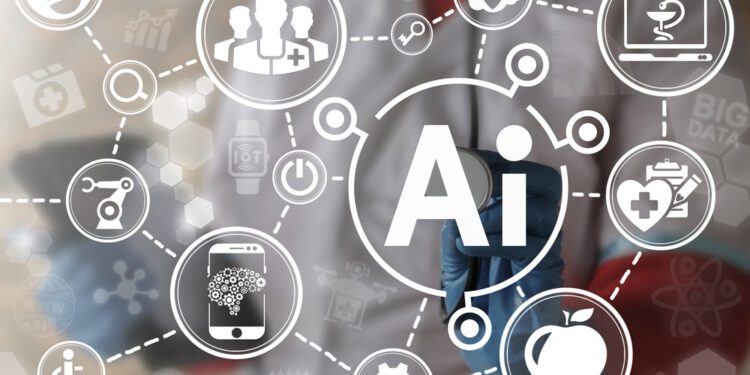Artificial intelligence is helping doctors diagnose and manage kidney disease and improving diagnostics and analysis of patient data.
Artificial intelligence holds great promise to help medical professionals gain key insights and improve health outcomes. However, AI adoption in healthcare has been sluggish, according to a March 9 Brookings Institution report. Despite the slow uptake of AI in healthcare, health insurer Optum revealed in a December 2021 survey that 85 percent of healthcare executives have an AI strategy, and almost half of executives surveyed now use the technology.
“We’re no longer in an infancy stage,” says Natalie Schibell, vice president and research director for healthcare at Forrester Research, noting the impact of the COVID-19 pandemic in accelerating digital transformation. That includes AI.
Schibell sees a deep need for AI to address healthcare problems such as chronic illness, workforce shortages and hospital readmissions. These factors are leading healthcare organizations, insurance companies and pharma and life sciences organizations to adopt AI, she says.
AI is playing a role in improving data flow, recognizing and processing both structured and unstructured data, Schibell says. “We’re at the point now where if you’re not investing in AI or if you’re on the fence about investing, you’re going to be left in the dust,” she says.
Schibell points to new efficiencies in speeding up data analysis. “AI identifies patterns, and it’s generating insights that might elude discovery from a physician’s manual efforts,” she says.
Dr. Taha Kass-Hout, vice president of health AI and CMO at Amazon Web Services, notes that 97 percent of healthcare data goes unused because it’s unstructured. That includes X-rays and medical records attached to slides. Machine learning (ML) allows healthcare professionals to structure and index this information. Amazon HealthLake is one service that enables searching and querying of unstructured data.
In addition, ML and natural language processing (NLP) help healthcare organizations understand the meaning of clinical data, he adds.
For example, the Children’s Hospital of Philadelphia turned to AWS AI services to integrate and facilitate the sharing of genomic, clinical and imaging data to help researchers cross-analyze diseases, develop new hypotheses and make discoveries.
AI Scours Documentation for Cancer Studies
The Fred Hutchinson Cancer Center in Seattle used NLP in Amazon Comprehend Medical to review mountains of unstructured clinical record data at scale to quickly match patients with clinical cancer studies. NLP helped physicians review about 10,000 medical charts per hour to find patients with the right inclusion criteria, removing the “heavy lifting,” Kass-Hout says.
“There are laborious inclusion criteria to go through, where you have to identify a lot of characteristics about the patient to determine whether they meet the criteria to be enrolled in a clinical trial. Often you have to read the entire medical history,” Kass-Hout says.
Less than 5 percent of patients match the recruitment criteria for these types of clinical trials, according to Kass-Hout, partially due to the challenges of identifying the right information among unstructured data.
AI Helps Diagnose and Manage Kidney Disease
AI is helping doctors diagnose and manage kidney disease and predict trajectories for kidney patients, says Dr. Peter Kotanko, head of biomedical evidence generation at the Renal Research Institute (RRI) and adjunct professor of medicine for nephrology at the Icahn School of Medicine at Mount Sinai in New York.
Kotanko indicates that nephrologists and other medical disciplines use AI and ML to assess images from radiology or histopathology, as well as images taken by smartphones to diagnose a patient’s condition.
“AI not only relies on structured lab data or data stored in electronic health records, but also, of course, uses tools like natural language processing to extract insights from the unstructured texts,” he says.
Meanwhile, ML is used to predict patient outcomes, including hospitalization, and to identify which patients may have COVID-19. RRI uses deep learning to analyze images from smartphones or tablets to assess a patient’s arterio-venous vascular access, which is used to connect a patient to the dialysis machine.
“A convolutional neural network, or CNN, analyzes these kinds of data and sends a respective assessment back to the user within a second or so,” Kotanko says. “Images are sent from the tablet or smartphone to the cloud where a CNN receives the data and then provides the respective response.”
AI Healthcare Use Cases in 2023 and Beyond
Here are some trends for AI use in healthcare within the next three years:
- Natural Language Processing and Conversational AINLP and conversational AI have made advances in healthcare, but Schibell expects to see expanded use of virtual assistants in the next one to three years. “Symptom checking and triage will be more mainstream, more sophisticated,” she says. AI will help providers weed out which patients have emergency needs versus those that a primary care physician can address.Healthcare AI use cases that involve employing conversational AI include preparing for an appointment and providing driving directions to a hospital, Schibell says. Conversational AI will advise patients on whether to fast before an appointment, what to wear and what they should do before an exam.
- Automated SchedulingLook for improvements in automated scheduling in the coming year and beyond. “With retail health now shifting to primary care, you will see these companies using automated scheduling the most,” Schibell says. “There aren’t a whole lot of traditional healthcare providers using it.”
- Integrating Omics, EHRs and WearablesAI will combine omics — biochemical assays such as metabolomics, genomics and transcriptomics — with EHRs and data from wearable devices, according to Kotanko. Wearable data combined with omics data could differentiate patient phenotypes, Kotanko says.“This whole aspect of data collection through pervasive sensing devices will grow, and I think AI will help to digest and integrate these high-dimensional inputs,” Kotanko says.
- Government Regulations of AI Will TightenAs the FDA decides which medical devices to recognize, AI regulation will become stricter in the U.S. and in Europe, according to Kotanko.“Startups in the medical AI space will need to deal with this component,” Kotanko says. “I think that will be a significant move from the medical decision support system domain into the medical device domain.”
- AI Will Enable Targeted Diagnostics and Personalized CareAs healthcare professionals make sense of unstructured data, they’ll be able to develop targeted diagnostics and personalize care, Kass-Hout says. “A lot of our customers are trying to index this data so they can structure it. However, it’s an error-prone process,” Kass-Hout says. “It’s very challenging operationally and due to cost, with these tools, we are really removing all that heavy lift for a lot of these customers, so they can focus on delivering care for their patients and populations.
Courtesy HealthTech Magazine. By Brian T. Horowitz. Article available here.












